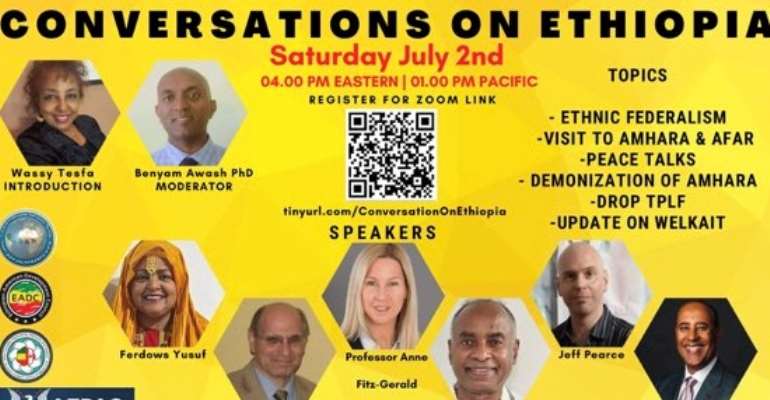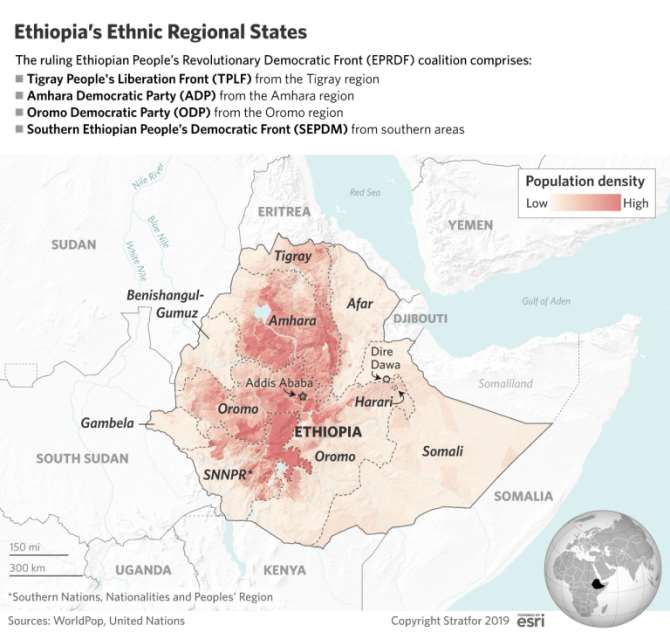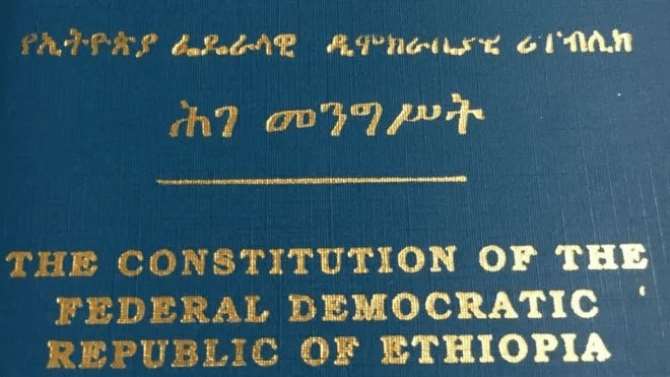Ethno-Nationalism Threatens The Very Existence of The Ethiopian Nation-State

On Saturday-July 2, I was pleased to participate in a zoom conference sponsored by the American Ethiopian Political Affairs Committee (AEPAC) on the effects of ethno-nationalism in Ethiopia. In a brief presentation, I discussed the need to eliminate ethno-nationalism for the preservation of the Ethiopian nation-state. My analysis and recommendations are unique, provocative, and challenging.
I suggest Ethiopian leaders and thoughtful citizens review my remarks printed below, which can serve as a foundation for Ethiopian policy, moving forward.
Read my presentation below:
Let me start by thanking the American Ethiopian political affairs committee for allowing me to make this presentation today.
I will begin with some challenging conceptions that people may consider irrelevant to our discussion today, but for me these are principles that are very relevant to the aims of this conference. For sake of brevity, I have organized my presentation into four crucial topics, followed by recommendations.
Human beings are the only species endowed with the unique quality of the creative imagination, in shorthand creativity, or what Plato called “hypothesizing the higher hypothesis.” With this exceptional quality of creative thought, intrinsic only to humankind, we human beings are capable of discovering the scientific and cultural principles of the universe that we ourselves live in. It is by applying these discovered principles that we transform the universe. Humankind has progressively altered the physical universe, making it more propitious for the growth of the human race, both qualitatively and quantitatively. This is not conjecture, but the truth. How did the human species, that once populated the African continent with thousands of “hunters and gatherers” come to transform our planet with eight billion people? Through our innate powers of discovery.
This quality of creative mentation is fundamental to what we call human nature, and it is universal. It is the prevailing quality that defines each one of us as a human being.
There are of course differences among us in language culture and geography. However, we human beings are identical in our potential for creative thought; in our potential to make contributions in discovering the Creators laws embedded in our physical universe.
Thus, we are as human beings far more similar than we are different. Our likeness is universal, our differences insignificant.
Human beings willfully begotten the Nation State. From centuries of dialogue and discussion, we made the conception of the Nation State a reality and codified it in the 1648 Treaty of Westphalia. Humankind established the Nation State as human law, because it was understood to be a necessary institution for the continued existence of civilization. Without the existence of the Nation State, society would not continue to progress.
The Nation State is the means for people to self-govern, to deliberate for their future. Nation States provides the continuity of the citizen’s contributions over generations, from the past to the future. The Nation State has the responsibility to protect and nurture the powers of human creative thought for the benefit of all its people. The Nation State therefore must be sovereign from internal and external assaults on its existence.
The Nation State must be inviolable. It may still be an imperfect institution, but it is the most advanced institution we human beings have invented, to advance our humanness, and protect the rights of our citizens. The nation state must be preserved and defended until we create a more perfect organization of society.
Ethno-Regional Federalism of the former ruling ERPDF coalition party failed.
A sustainable Nation State transcends all local interests and transcends ethnicity.
Ethnicity can and should contribute to the beauty and enrichment of a civilization. Ethno-nationalism is entirely different. It functions as a cancer on society, which if allowed to exist, will undermine, and eventually destroy the Nation State. Ethno-nationalism usurps the power of the sovereign Nation State by insisting that as an ethnic group it should be treated as if it were a nation. Ethno-nationalism is inherently racist and discriminatory because it separates people of the same nation according to biological and geographical distinctions. Human beings are not defined by their blood-lines! It creates antagonistic ethnic based fiefdoms in false competition with each other for power. While the Nation State exists to provide for the general welfare of all its people, the followers of ethno-nationalism seek the aggrandizement of the interests of their ethnic group. Those supporting ethno-nationalism whether they know it or not, are advocating the destruction of their nation, in this case, Ethiopia.
In my study of African history, I have found that weakened Nation States contributed to the lack of economic development for that country. I was horrified and saddened when I first arrived in Nigeria in 1994, to view the reality of ethnic competition and its effects on the nation.
The present 1.5 billion people living on the African continent should be organized into viable Nation States, which are not a mere collection of ethnicities. I was told when I was in Nigeria that the country had 250 different ethnicities in addition to the three dominant ethnic groupings. This reality is still affecting Nigeria today. There are a reported 3,000 different ethnicities across the African continent. We must work to establish on the African continent, Nation States that are politically and economically sovereign. The people of each nation should determine their future through deliberations, debate, and discussion of ideas. There can be no claims to ethnic superiority or a historical right to political control. As President Lincoln said when he was campaigning to lead the USA, the nation must protect equally the lives of all its men and women.
In a true Republic, the government has the obligation to develop the creative potential of each and every citizen, and each and every child born. Each citizen has the obligation and the right to use his or her creative potential to contribute to the peaceful and prosperous future of their nation for generations to come. These are the conditions of government and citizenship which we should work to foster throughout the many nations on the African continent. I do not believe that Africa will prosper as its population climbs to 2.5 billion people in the next 30 years, unless we create strong Nation States and educated citizens who act in the interests of their nation, not their ethnicity.
Ethnicity should be muted and removed from the political arena
V. Recommendations
I suggest we use the following recommendations, which are not prioritized, to formulate the best policy for Ethiopia, moving forward.
The Preamble of Ethiopia’s Constitution properly emphasizes the conception of a united nation with a common purpose and goal for all its people: “advancing our economic and social development,”… “common interest….and the emergence of a common outlook,” and “to live as one economic community.” Article 14 resonates with the US Constitution, stating: “Every person has the inviolable right to life, the security of person, and liberty.” The same principle is echoed in Article 43 of the Constitution: The Right to Development. “The basic aim of development activities shall be to enhance the capacity of citizens for development and to meet their basic needs.”
The weakness of the Constitution begins in Article 8: Sovereignty of the People, where sovereign powers are divided up between “Nations, Nationalities and Peoples of Ethiopia.” This is an obvious compromise to ethnicity. In truth; there is only one Ethiopian people and only one Ethiopian nation. The divisions in Ethiopian society are made explicit in Article 39: “Every Nation, Nationality and People in Ethiopia has an unconditional right to self-determination, including the right of secession……the right to a full measure of self-government…”
This separation of Ethiopians into multiple groups, outlined in the Constitution, is the seed for the conflicts gripping Ethiopia today. Ghana has outlawed the existence of parties which are based on ethnicity. Rwanda has taken a different approach for the same purpose.
- A National Dialogue
I propose we conduct the national dialogue on the highest ideational plateau. We should have an inclusive, unfettered discussion, which may be contentious at various points in time. The central theme of this national dialogue should be the conceptual difference between citizenship and ethno-nationalism. This disease of ethno-nationalism has plagued Ethiopia and many other African countries for years and has to be addressed head on in the most straightforward manner. It is the only way that I can see that the citizens of Ethiopia can come to an understanding of what it means to be a citizen of the nation of Ethiopia. This will be a challenging and lengthy process, but I see no way to avoid this path.
- A National Mission to Unite the People
Prejudices from ethnic and religious difference will not evaporate over-night. We should create a platform with the most propitious conditions for the shedding of these biases over time. To help accomplish this, I propose that we articulate a national mission for Ethiopia, which will also be regional in scope.
Let the nation of Ethiopia adopt the mission to eliminate poverty and hunger. Ethiopia should also commit to become the economic engine for the Horn of Africa, to help the other nations in the region end the economic suffering of their people. With this shared mission, for the benefit of all Ethiopian people, we can create a common self-interest, fostering the collaboration of each Ethiopian citizen with the rest of society. We know that under the proper environment, Ethiopians will desire the best conditions for their lives and those of their offspring. With this common interest for development of the nation for future generations in the forefront, each Ethiopian citizen can locate his or her self-interest in the interest of the other. Even though prejudices may still exist, Ethiopians can accept working together for the common interest of creating a prosperous future for their children and grandchildren. All human beings are born good and have the potential noble for actions.
No doubt, this approach will also be challenging, but it can be effective over time in eliminating the hostilities that have developed from a history of division and ethno-nationalism.
My dear friends, I hope my modest contribution will help lead us to a better Ethiopia in the months and years ahead.
Thank you very much for listening. I yield back the balance of my time.
Lawrence Freeman is a Political-Economic Analyst for Africa, who has been involved in economic development policies for Africa for over 30 years. He is a teacher, writer, public speaker, and consultant on Africa. He is also the creator of the blog: lawrencefreemanafricaandtheworld.com . Mr. Freeman’s stated personal mission is; to eliminate poverty and hunger in Africa by applying the scientific economic principles of Alexander Hamilton.


